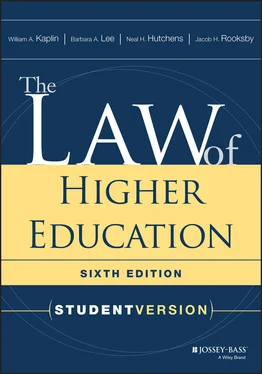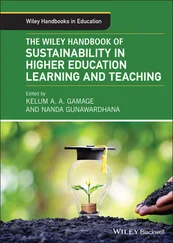The Supreme Court of Florida affirmed the appellate court's ruling on the issue of the university's duty to warn the student ( Nova Southeastern University v. Gross , 758 So.2d 86 (Fla. 2000)). In addition to agreeing with the appellate court's reasoning that the university had assumed a duty of “acting reasonably in making [those] assignments” to a specific location, the court declared: “There is no reason why a university may act without regard to the consequences of its actions while every other legal entity is charged with acting as a reasonably prudent person would in like or similar circumstances” (758 So.2d at 90). The court stated that the college's duty was one of reasonableness in assigning students to practicum locations, a duty that required the university to warn students of potential dangers posed by that location.
Universities and their employees may also face negligence liability claims for actions by third parties at off-campus locations. In Rinsky v. Trustees of Boston University , 2010 U.S. Dist. LEXIS 136876 (D. Mass. December 27, 2010), a social work student was required to complete an internship at a social service agency as part of her academic program. The student notified both the faculty supervisors and the on-site supervisor that a client was physically touching and stalking her. She alleged that neither the on-site supervisor nor the faculty members took action either to stop the offensive touching or to assign her to a different internship. She sued both the agency and the university for sexual harassment, negligence, and several other tort claims. The court rejected the university's motion to dismiss the student's negligence and sexual harassment claims.
For negligence liability purposes, then, whether the location at which a student or staff member is injured is on or off campus is not the controlling issue. What is more important, according to these cases, is whether the college took adequate precautions to ensure the safety of its students, even if it did not have total physical control of the site.
Simply because a student has an off-campus assignment does not mean that the college assumes a duty to ensure that the student arrives at the off-campus location safely. In Stockinger v. Feather River Community College , 4 Cal. Rptr. 3d 385 (Cal. Ct. App. 2003), a student who was injured when she was riding to an off-campus assignment in the back of a classmate's pickup truck sued the college and the course instructor for negligence in planning and supervising the class assignment. The court rejected her claim, ruling that “a college must be able to give its students off-campus assignments, without specifying the mode of transportation, and without being saddled with liability for accidents that occur in the process of transportation” (4 Cal. Rptr. at 401).
Study abroad programs may present liability issues for colleges as well. Since the mid-1990s, several colleges have been sued by students, or their families, for injuries or deaths to students participating in study abroad programs. Although the courts have rejected claims that a college that sponsors a study abroad program is the insurer of students' safety, the courts are imposing a duty of reasonable care on colleges and universities that requires them to take steps to protect students, faculty, and staff from reasonably foreseeable harm. Particularly if the program takes place in a country, or in a portion of a country, that is deemed unsafe or prone to criminal activity, considerable precautions will need to be taken by the college.
For example, St. Mary's College (a public college in Maryland) settled a lawsuit filed by three students who were injured during a study abroad trip to Guatemala. While a group of 13 students, two faculty members, and the study abroad director were returning by bus to Guatemala City from a trip to a rural area, the bus was stopped by armed bandits and robbed. Five of the students were raped. Three of the students sued the college, arguing that insufficient precautions were taken for their safety and that additional precautions, such as an armed guard, a convoy of several vehicles, and the selection of a safer route would have prevented the injuries. The college argued that sufficient precautions had been taken and that, because previous study abroad trips to Guatemala had been uneventful, the injuries were not foreseeable. However, the college settled with the plaintiffs in order to avoid prolonging the dispute.
A student was unsuccessful in persuading a Minnesota court to impose liability on the University of Minnesota for an assault by a taxi driver in Cuernavaca, Mexico, where the student was participating in a study abroad program. In Bloss v. University of Minnesota , 590 N.W.2d 661 (Minn. Ct. App. 1999), the student asserted that the university was negligent in not obtaining housing closer to the location of the classes, in not providing safe transportation to and from campus, and in not warning the students about the possibility of assault. The court ruled that governmental immunity protected the university from liability for its decision to use host families to house the students. But with respect to the student's allegations concerning safety issues, immunity would not protect the university if it had breached its duty in that regard. In this case, however, the court ruled that the university had behaved reasonably. There was no history of assaults on students or tourists in the 18 years that the program had operated in Cuernavaca. Students had been given a mandatory orientation session on safety and had been told not to hail a taxi on the street (which the student had done), but to call a taxi company. The assault occurred when the student took a taxi to meet friends—not to attend class. Given the university's efforts to warn students and the lack of foreseeability of the assault, the court refused to impose liability on the university. For a case with similar facts and the same outcome, although based upon sovereign immunity, see Mattingly v. University of Louisville , 2006 U.S. Dist. LEXIS 53259 (W.D. Ky. July 28, 2006).
3.2.2.5 Liability for cocurricular and social activities.In addition to potential premises liability claims, an individual injured as the result of a college- or university-sponsored event, or as a result of activity that is allegedly related to school activities, may attempt to hold the college or university liable for negligence.
For example, in Bishop v. Texas A&M University , 35 S.W.3d 605 (Tex. 2000), a student participating in a university-sponsored play was stabbed accidentally during a performance of Dracula . The play was directed by a nonemployee, but two faculty members served as advisors to the student production. Although the state appellate court found the university immune from liability under the state's tort claims act because the faculty members were not acting within their job responsibilities of teaching, the Texas Supreme Court reversed. The court said that, although the faculty advisors were volunteers, their participation as advisors was considered when salary increase decisions were made, the drama club was required to have a faculty advisor as a condition of receiving university recognition, and university policies required the faculty advisors to enforce its rules and regulations. The high court ruled that a jury could potentially find that the faculty advisors were negligent and thus that the university was liable to the injured student. On remand, the trial court found that the advisors were not protected by governmental immunity and that they were negligent in supervising the students. A state appellate court affirmed in Texas A&M University v. Bishop , 105 S.W.3d 646 (Tex. App. 2002). However, the Texas Supreme Court reversed, ruling that the university had not waived its sovereign immunity because the conduct of the faculty advisors did not fall within a statutory exception to immunity, and the director was not an employee of the university (156 S.W.3d 580 (Tex. 2005)). In a case with very similar facts, a Kansas appellate court ruled that the state's tort claims act shielded Pittsburgh State University from liability for a student's injury ( Tullis v. Pittsburg State University , 16 P.3d 971 (Ct. App. Kan. 2000)).
Читать дальше












